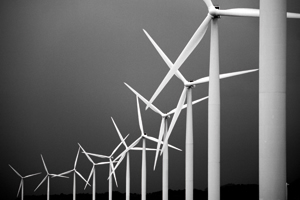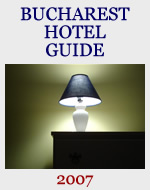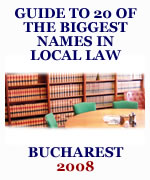Largest wind project in Dobrogea to start construction
 |
|
|||||||||||||
Czech energy company CEZ, owner of the electricity distributor Electrica Oltenia, has purchased two wind farm projects in the Dobrogea region from Polish-based green energy group Continental Wind Partners (CWP) in an investment plan worth 1.1 billion Euro.
This is due to start construction this month for a delivery date of the end of 2009.
Set in the adjacent zones of Fantanele and Cogealac, 17 km from the Black Sea coast, the first farm of an installed capacity of 347 MW will include 139 wind turbines. This farm can be extended to contain a 600 MW installed capacity. One MW of installed power needs an investment of about 1.5 million Euro.
At present, the Romanian power grid company Transelectrica has given permission for companies to connect only 2,000 MW of installed power countrywide through wind farms to the grid. Most projects target the Dobrogea region although there are some proposals for Moldavia.
Other projects include the Portuguese group Martifer, which expects to see one wind farm erected in 2008. Meanwhile Italy’s Enel has bought out Blue Line, a Romanian company holding the rights to develop wind energy projects in Dobrogea, which are due to be operational in 2010. Local developer Rokura has also sold a project to Spanish energy giant Iberdrola for 600 MW in the same region, with the construction due to start next year.
EU cash available for
small green energy
EU funds for small renewable energy projects are now available from the Ministry of Economy and Finance. The Ministry predicts it can allocate its first funds by the end of 2008. The maximum value of one project under consideration for EU funds is 50 million Euro.
The Government has decided to pay up to 50 per cent of the cost for a renewable energy project located anywhere in the country except for Bucharest and Ilfov county. In these two areas, the authorities will only pay 40 per cent of the project’s value. A total amount of 200 million Euro per year is available until 2013, which includes 30 million Euro from the state budget. From the initial interest, wind energy projects are the most popular, followed by micro-hydropower stations and solar energy, stated a Ministry official.
Government dream
to revive hydro-power
Romania’s Government is investigating the construction of a new hydro-power station on the Bulgarian border at the Danube river near Turnu Magurele, Teleorman county, although the project is far from finalised.
Prime Minister Calin-Popescu Tariceanu stated that he already has the agreement from his Bulgarian counterpart. This project could help boost Romania’s percentage of green energy from the current 17.8 per cent to the EU target of 24 per cent by 2020. Around one sixth of Romania’s energy currently comes from hydropower, the largest source of which is the joint Serbian-Romanian project Portiile de Fier (Iron Gate) on the Danube at Turnu-Magurele. The Government is also interested in a potential project to build a hydro-power plant at Tarnita-Lapustesti, Cluj county with 1,000 MW installed power. Minister of Economy and Finance Varujan Vosganian said that this plant needs one billion Euro in investment and would take six years to build. This project was also annouced in the previous Social Democratic Government between 2000 and 2004, but nothing since materialised.
Compromises needed
for mega-steel deal
Austrian steel manufacturer Voestalpine’s prospecting of the Romanian market for its multibillion Euro investment over 1,000 hectares will need compromises from state and local authorities.
Constanta city ringroad and a railway will need relocation if the Austrian steel manufacturer Voestalpine decides to invest 5.5 billion Euro in a production facility in Dobrogea, east Romania. State gas and electricity transport companies Transgaz and Transelectrica must also connect the steel manufacturer to the national gas pipe network and the electricity grid at no charge.
At the end of June, the Austrian company organised an auction and the biggest land owners in the area of Agigea, Constanta county, Arca East Invest and Chayton Capital, agreed to sell 96 hectares of land to Voestalpine. The Austrians will make a downpayment of five per cent of the price, thus compensating the owners if the steel producer pulls out of the deal.
Voestalpine plans to open a plant manufacturing five million tonnes of steel per year, which will employ up to 5,000 when operational. Ukraine, Turkey and Bulgaria are other countries in the running for this project. By 2012 Voestalpine aims to build its own generator of electricity at the site, a power station with an installed power of 500 MW.
Interest rate hiked on high inflation
Romania’s Central Bank (BNR) last month raised the key interest rate from 10 per cent to 10.25 per cent, putting further pressure on lending and promoting a prudent approach to credit.
The rise in incomes above the level of productivity gains and the ongoing rapid pace of credit expansion are putting pressure on inflation, argues the BNR. The inflation rate stood at 9.04 per cent in July, up from 8.61 per cent in June, which is the highest since 2005.
This was due to an increase in prices for natural gas by 12.53 per cent and electricity by 4.51 per cent. At the same time the bank has left unchanged the existing minimum reserve requirement ratios on leu and foreign currency-denominated liabilities of credit institutions. The central bank has modified its predictions for the annual inflation rate this year from six per cent to a 6.6 per cent.
Agro and construction materials: largest Romanian firms in country
Agricultural group Interagro and construction materials firm Arabesque are the largest Romanian companies by turnover, according to a Ziarul Financiar analysis, based on the company results for 2007 reported to the Ministry of Finance.
The two companies are ranked 26 and 30, respectively, among firms operating on the Romanian market. Cement industry giants such as Lafarge, Holcim and Carpatcement and energy companies like Rompetrol are caught from behind by retailers Real Hypermarket and Praktiker Romania, which entered the top 50 for the first time.
Most companies registering losses last year were active in heavy industry. Daewoo Mangalia Heavy Industries, ArcelorMittal Tubular Products Roman and Michelin Romania posted the highest losses. Austrian-owned Petrom is the largest company in Romania, followed by ArcelorMittal steel (registered in the Dutch Antilles) and then Renault-owned Automobile Dacia.
Short News
Half of water does not
go down the drain
In 2007 Romanians paid out 161.4 million Euro for drinking water which distributors lost through leakages in old pipes. Around 41 per cent of the 1.06 billion cubic metres of tap water distributed escaped from the water supply network, according to the National Institute of Statistics. The average price for one cubic metre of distributed water is about 0.6 Euro. In comparison, the Czech Republic lost only one fifth of the total drinking water production last year.
Rompetrol targets oil refineries in west Europe
KazMunaiGaz’s Rompetrol has investment plans worth between five and six billion Euro, according to an interview given to Evenimentul Zilei by Ioan Sturza, the general manager of oil company Rompetrol in the Republic of Moldova. This money will be used in a plan to acquire oil refineries and gas station networks in western Europe. “It is also possible to invest in some gas stations in Kazakhstan but not under the Rompetrol brand,” said Sturza, former Prime Minister of Republic of Moldova and the second-most important person in Rompetrol, after CEO Dinu Patriciu. In 2007, Patriciu sold 75 per cent of Rompetrol’s share capital to KazMunaiGaz for an estimated 1.83 billion Euro.
Sensiblu owners see shares plummet
Market leader in pharma retail and distribution in Romania, A&D Pharma, has dropped in value on London Stock Exchange’s AIM from a value of 500 million Euro at the beginning of 2008 to only 71 million Euro last August. Between January and August 2008 one share of A&D Pharma, which owns the Sensiblu pharma chain, fell from 15.5 Euro to 2.15 Euro, with shareholders losing over 250 million Euro. Although A&D’s sales increased by 28 per cent this year, the company experienced a 92 per cent decrease in profits. Following these results, Dragos Dinu, the group’s CEO, will be replaced by Robert Popescu, the company’s manager of the distribution division.
Ikea shuts factory and leaves Romania
Swedish manufacturer Ikea has closed down its production facility in Siret, Suceava county, and ended its investment plans for a 45 million Euro furniture factory in Gura Humorului, north-east Romania. About 500 people have lost their jobs in Siret. The Swedish renounced their plans because the region failed to offer the furniture manufacturer enough wood as raw material to meet the demands of the international group. The Ikea retail outlets, through a franchise, will continue to open in the country.
Local mineral water groups consolidate
Romanian mineral water bottler Carpatina has acquired still mineral water producer Herculane Water. The company will rebrand the water from the Herculane spring in Caras-Severin as ‘Carpatina Plata’ and estimates it will double its total sales in the next year. To acquire Herculane Water, Carpatina and its majority stakeholder Lipomin took a seven million Euro loan from Austria’s mezzanine financiers Mezzanine Management Central Europe.
Bere Azuga enters the water market
Romanian beer producer Bere Azuga has begun bottling water for the consumer market under the name Azuga water. The beer producer has also acquired 39 per cent of the shares in water company Perla Covasnei, located in Sfantu-Gheorghe for around 1.2 million Euro and 95 per cent of Mixt-Elis, a company which holds 12.56 per cent of the stock of Perla Covasnei. This company produces 25 million litres of fizzy and flat mineral water per year, just over a tenth of the 230 million litres pouring out from the market leader, Romanian-owned Borsec. Local consumption of bottled fizzy and flat mineral water per capita is about 45 to 50 litres per year, compared to the EU average of 120 litres.
New airport for capital approved
Romania’s Government has approved the construction of a new airport in Bucharest, which will probably be located near Adunatii Copaceni, Giurgiu County, 20 kilometres south of Bucharest. At present the Capital has two airports, both of them north of the city: Henri Coanda International Airport in Otopeni and Aurel Vlaicu International Airport in Baneasa.
Minimum wage increase deal
before elections
From October 2008 Romanians will see a 10.5 Euro increase in the net minimum wage to 151.2 Euro per month. Prime Minister Calin Popescu Tariceanu has also agreed with the largest unions to further increase this to 168 Euro from January 2009. During the meeting with union representatives, Minister of Economy and Finance Varujan Vosganian said that, according to the National Commission of Prognosis, the minimum wage should rise to 371 Euro per month in 2014.
Growth circles nine per cent mark
Recession is not a problem for Romania, as the country’s GDP registered a 8.6 per cent growth in the first half of this year, including a 8.9 per cent rise in the second quarter of 2008. “Both figures set new records for economic indicators in the last two decades in Romania,” said Varujan Vosganian, Minister of Economy and Finance. In the first three months of 2007, after Romania joined the European Union, the country saw a 6.1 per cent economic growth, while in the second quarter of the same year it rose by 5.7 per cent. By 2012 Romania’s GDP could double the 2007 figure to reach 220 billion Euro and further double to 450 billion Euro in 2020, estimates the Ministry.
Car owners taxed on
hypothetical pollution
Romania’s new car tax swaps its controversial calculation of high taxes for an older car for a greater levy on newly-built vehicles. The new pollution tax is a u-turn on the car tax introduced last year, which was attacked by the European Commission as anti-competitive because it levied higher tariffs on older, second-hand cars with less efficient engines than new vehicles. But now a driver must pay more tax if his or her car is of a higher value, which penalises new models. If a car does not include airbags or air conditioning, for example, the pollution tax is lower. The Government has come to this conclusion based on the theory that a new car will, in the future, contribute more pollution to the environment than an older vehicle. The previous tax was valid until last July.

















